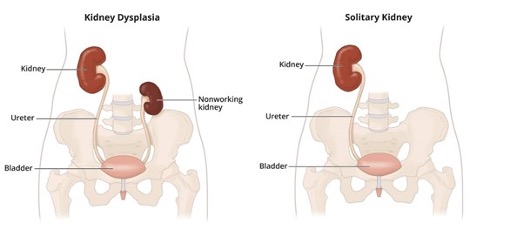Last updated: March 18, 2024
Medically reviewed by: NKF Patient Education Team
Most people live healthy lives with one kidney, but it’s important to stay healthy and protect that kidney.
About Living with One Kidney
There are different ways a person can have a single kidney. A solitary kidney means you have one kidney. A solitary functioning kidney means that you have two kidneys and only one is functioning.
Most people live full, healthy lives with one kidney. However, it's important to stay as healthy as possible, and protect the only kidney you have.
Causes
Reasons why a person may have one kidney are as follows:
- Renal agenesis: When a person is born with one kidney, or a solitary kidney.
- Kidney dysplasia: When a person is born with two kidneys, but only one of them works.
- Surgery: A person may have had one kidney removed during an operation in order to treat an injury or a disease like cancer.
- Transplant donor: A person may have helped someone in need by donating one kidney to a person who needed a kidney transplant. A person with kidney failure may receive a kidney transplant because their kidneys are not able to work well enough to keep them alive. Donating an organ to someone provides a life-sustaining gift.

Complications
In general, most people with a single, healthy kidney have few problems. However, some people with renal agenesis or kidney dysplasia may have some loss in kidney function later in life. This usually takes 25 years or more to happen. The loss in kidney function is usually mild, and life span is not impacted. Most people with one kidney live healthy, normal lives with few problems. In other words, one healthy kidney can work as well as two.
There may be a chance of having high blood pressure.
Some people can also develop protein in the urine (albuminuria) or have a progressive loss of kidney function over time (chronic kidney disease). Therefore, you should have your kidney function checked at least once a year.
Diagnosis
Generally, people born with one kidney do not show symptoms. They may never know they have one kidney. However, some people find out they have one kidney by chance after having an imaging test, such as x-ray or an ultrasound. They might find out after a surgical procedure for another unrelated injury or condition.
Tests
Your healthcare professional will check your kidney function by giving you a simple urine test and a simple blood test. Estimated glomerular filtration rate (eGFR) is a blood test that checks how well the kidneys are filtering your blood. A urinary albumin-to-creatinine ratio (uACR) is a urine test that checks for high protein (albumin) in the urine, which is a sign of kidney damage. Other tests (such as an ultrasound or CT scan) may be used if more information is needed.
You should also have your blood pressure checked at least once every year.
Treatment
There are many things you can do to help protect your kidney.
|
|
Medications
People with one kidney who do not have kidney disease, or any other condition will not need medicines. A person with a transplanted kidney will need to take anti-rejection medicines (immunosuppressants), which lower the body's ability to reject a transplanted organ.
If a person gets kidney disease, one or more medicines may be used to help slow down the kidney disease. Depending on the type of kidney disease, these medicines can include an ACE inhibitor/ARB, diuretic (water pill), an SGLT2 inhibitor and/or an nsMRA.
Nutrition
Most people with one healthy kidney do not need to follow a special diet. However, nutrition and eating healthy are still important parts of your health. Eating healthy generally includes having more fruits and vegetables, and eating foods that are less processed and as close to fresh as possible.
If you have a kidney transplant due to kidney disease or kidney failure, you may have some restrictions. You may need to change what you eat if you have any conditions such as high blood pressure or diabetes. If you have questions about your diet, talk to your healthcare provider or a registered dietitian.
Exercise
Physical exercise is healthy and good for you. However, it's important for someone with only one kidney to be careful and protect it from injury. This recommendation applies to anyone with a single kidney, including people who were born with one kidney and people with a kidney transplant. Some healthcare professionals think it’s best to avoid contact sports like football, boxing, hockey, soccer, martial arts, or wrestling.
Wearing protective gear such as padded vests under clothing can help protect the kidney from injury during sports. This can help lessen the risk, but it won't take away the risk. Talk to your healthcare professional if you (or your child) want to join in contact sports. You should always think about the risks involved in any activity, and carefully consider whether the risks outweigh the benefits.
The Centers for Disease Control and Prevention (CDC) recommends 150 minutes of physical activity per week, which can be done in any interval – spread it out. Don't confuse physical activity with vigorous exercise. Any type of body movement helps including walking, gardening, dancing or doing chores. The key is to find something that you enjoy and works best for you.
Preparing for your appointment
Questions to ask
- Did I receive eGFR and uACR test? If so, what are the results?
- Am I at a healthy weight?
- Is my blood pressure within the recommended goal range?
- Do I have diabetes or prediabetes? If so, is my A1C within the recommended goal range?
- Are there any changes I should make to my diet?
- Is there anything I can do to maintain my overall health and kidney health?





